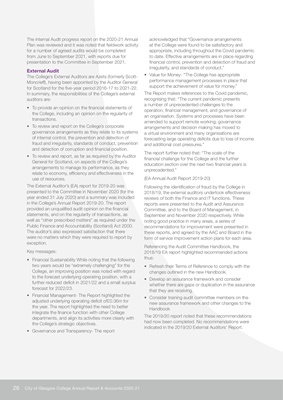
26 City of Glasgow College Annual Report & Accounts 2020-21
The internal Audit progress report on the 2020-21 Annual
Plan was reviewed and it was noted that fieldwork activity
for a number of agreed audits would be completed
from June to September 2021, with reports due for
presentation to the Committee in September 2021.
External Audit
The College's External Auditors are Azets (formerly ScottMoncrieff), having been appointed by the Auditor General
for Scotland for the five-year period 2016-17 to 2021-22.
In summary, the responsibilities of the College's external
auditors are:
• To provide an opinion on the financial statements of
the College, including an opinion on the regularity of
transactions.
• To review and report on the College's corporate
governance arrangements as they relate to its systems
of internal control, the prevention and detection of
fraud and irregularity, standards of conduct, prevention
and detection of corruption and financial position.
• To review and report, as far as required by the Auditor
General for Scotland, on aspects of the College's
arrangements to manage its performance, as they
relate to economy, efficiency and effectiveness in the
use of resources.
The External Auditor's (EA) report for 2019-20 was
presented to the Committee in November 2020 (for the
year ended 31 July 2020) and a summary was included
in the College's Annual Report 2019-20. The report
provided an unqualified audit opinion on the financial
statements, and on the regularity of transactions, as
well as "other prescribed matters" as required under the
Public Finance and Accountability (Scotland) Act 2000.
The auditor's also expressed satisfaction that there
were no matters which they were required to report by
exception.
Key messages:
• Financial Sustainability While noting that the following
two years would be "extremely challenging" for the
College, an improving position was noted with regard
to the forecast underlying operating position, with a
further reduced deficit in 2021/22 and a small surplus
forecast for 2022/23.
• Financial Management- The Report highlighted the
adjusted underlying operating deficit of£0.36m for
the year. The report highlighted the need to better
integrate the finance function with other College
departments, and align its activities more clearly with
the College's strategic objectives.
• Governance and Transparency- The report
acknowledged that "Governance arrangements
at the College were found to be satisfactory and
appropriate, including throughout the Covid pandemic
to date. Effective arrangements are in place regarding
financial control, prevention and detection of fraud and
irregularity, and standards of conduct."
• Value for Money- "The College has appropriate
performance management processes in place that
support the achievement of value for money."
The Report makes references to the Covid pandemic,
recognising that: "The current pandemic presents
a number of unprecedented challenges to the
operation, financial management, and governance of
an organisation. Systems and processes have been
amended to support remote working; governance
arrangements and decision making has moved to
a virtual environment and many organisations are
forecasting large operating deficits due to loss of income
and additional cost pressures."
The report further noted that: "The scale of the
financial challenge for the College and the further
education section over the next two financial years is
unprecedented."
(EA Annual Audit Report 2019-20)
Following the identification of fraud by the College in
2018/19, the external auditors undertook effectiveness
reviews of both the Finance and IT functions. These
reports were presented to the Audit and Assurance
Committee, and to the Board of Management, in
September and November 2020 respectively. While
noting good practice in many areas, a series of
recommendations for improvement were presented in
these reports, and agreed by the AAC and Board in the
form of service improvement action plans for each area.
Referencing the Audit Committee Handbook, the
2018/19 EA report highlighted recommended actions
thus:
• Refresh their Terms of Reference to comply with the
changes outlined in the new Handbook.
• Develop an assurance framework and consider
whether there are gaps or duplication in the assurance
that they are receiving.
• Consider training audit committee members on the
new assurance framework and other changes to the
Handbook
The 2019/20 report noted that these recommendations
had now been completed. No recommendations were
indicated in the 2019/20 External Auditors' Report.